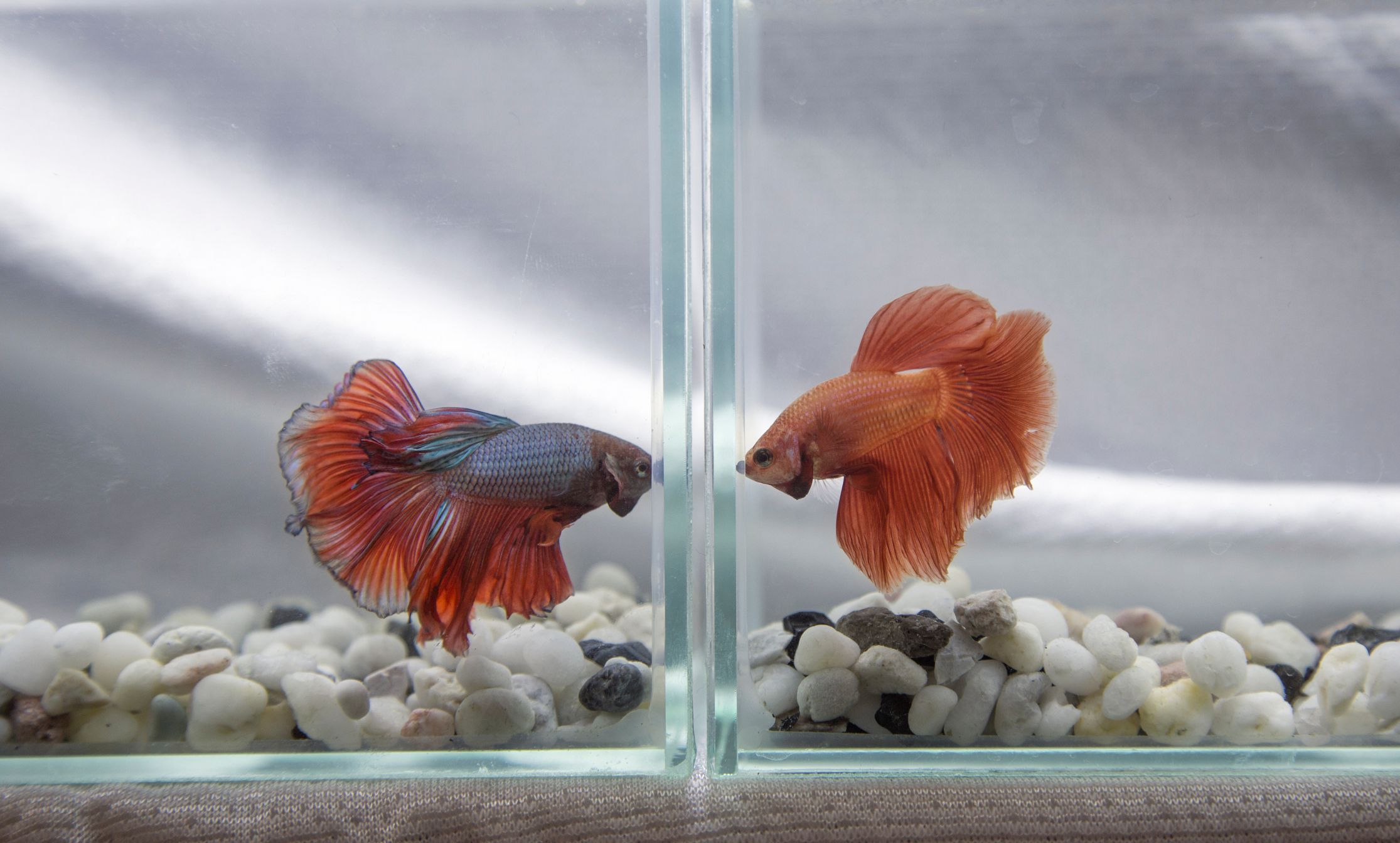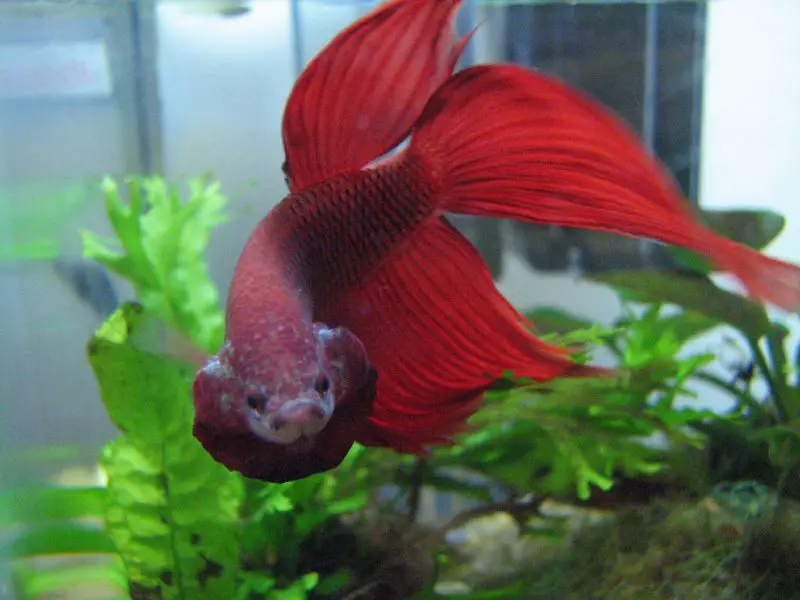Betta fish are known for their vibrant colors and stunning fin displays, but they can also be quite aggressive. If you’ve noticed your betta fish flaring its fins and displaying signs of anger, you may wonder if your fish is mad. Don’t worry, your fish isn’t necessarily upset with you. Aggressive behavior is a natural instinct for bettas, but it can be challenging to deal with as a pet owner. In this article, we’ll explore the causes of aggressive behavior in betta fish and provide tips on how to manage it effectively.
Whether you’re a seasoned betta fish owner or new to the hobby, it’s essential to understand your fish’s behavior and how to tackle any aggression that arises. With the right knowledge and approach, you can maintain a peaceful environment for your betta fish and enjoy their stunning beauty for years to come. So, let’s dive in and learn about the common triggers for betta aggression and how to manage it like a pro.
Aggressive behavior in betta fish is common, and it’s essential to know how to handle it. First, ensure that your betta is in a suitable environment with plenty of hiding spots. If the aggression persists, separate the betta from other fish in a separate tank. Avoid aggressive behavior by feeding your betta a balanced diet and maintaining a consistent schedule. Remember, bettas can become aggressive due to stress or boredom, so keep them stimulated with toys and plants in their tank.

Is Your Betta Fish Mad? How to Deal With Aggressive Bettas?
Betta fish are known for their colorful and vibrant appearance, making them popular pets all over the world. However, they have a reputation for being aggressive, which can pose a challenge for pet owners. If you notice your Betta fish acting out of character, it may be a sign that they are feeling agitated or angry. In this article, we will explore the reasons behind Betta fish aggression and provide you with tips on how to deal with it.
Understanding Betta Fish Aggression
Betta fish are territorial creatures, and they are known to become aggressive towards other fish, especially males. The aggression can be a result of their instinct to protect their territory, or it can be a sign of illness or stress. Some of the most common signs of Betta fish aggression include flaring their gills, chasing other fish, and biting.
If your Betta fish is acting aggressively, the first step is to assess their living conditions. Ensure that their tank is large enough and that they have plenty of hiding spots to retreat to. Overcrowding can sometimes lead to aggression, so make sure that you are not keeping too many fish in one tank.
In some cases, Betta fish aggression can be a sign of illness. If you notice that your fish is lethargic or has a loss of appetite, it may be best to consult a veterinarian.
Tips for Dealing with Aggressive Bettas
Dealing with aggressive Bettas can be challenging, but there are steps that you can take to help calm them down. Here are some tips to consider:
1. Separate the Aggressive Fish
If your Betta fish is constantly attacking other fish in the tank, it may be best to separate them. You can do this by setting up a divider in the tank or by moving the aggressive fish to a separate tank altogether.
2. Add More Hiding Spots
Betta fish love to have hiding spots where they can retreat when they feel threatened. Consider adding more plants or decorations to the tank to provide additional hiding spots. This can help reduce stress and aggression in your Betta fish.
3. Adjust the Water Temperature
Betta fish are sensitive to changes in water temperature, and extreme temperatures can sometimes lead to aggression. Ensure that the water temperature is within the recommended range for Betta fish, which is between 76°F and 81°F.
4. Keep the Tank Clean
Dirty water can sometimes lead to stress and aggression in Betta fish. It is important to keep the tank clean by performing regular water changes and removing any uneaten food or debris from the tank.
5. Avoid Overfeeding
Overfeeding can lead to obesity and other health problems in Betta fish. It can also cause aggression, as fish become territorial over their food. Ensure that you are feeding your Betta fish the recommended amount and avoid overfeeding.
The Benefits of Having a Betta Fish
Despite their aggressive tendencies, Betta fish make great pets for many reasons. They are low maintenance, making them an ideal choice for those who may not have a lot of time to devote to pet care. They are also beautiful to look at, with their vibrant colors and flowing fins. Additionally, Betta fish are known to have a calming effect, which can be beneficial for those who suffer from anxiety or stress.
Betta Fish vs Other Fish
Compared to other fish, Betta fish are a great choice for those who want a low-maintenance pet. They are less prone to illness and require less care than other fish. Additionally, Betta fish are known for their vibrant colors and flowing fins, making them a beautiful addition to any home. However, it is important to note that Betta fish can be aggressive towards other fish, so it is best to keep them in a tank by themselves.
Conclusion
Betta fish aggression can be challenging to deal with, but there are steps that you can take to help calm your fish down. Ensure that their living conditions are optimal, and consider separating the aggressive fish if necessary. By following the tips outlined in this article, you can help ensure that your Betta fish live happy and healthy lives.
Frequently Asked Questions
Betta fish are known for their vibrant colors and long fins, but they can also be quite aggressive. If you notice your betta fish displaying aggressive behavior, it’s important to understand what’s causing it and how to deal with it. Here are some frequently asked questions about aggressive betta fish:
1. Is my betta fish mad?
It’s important to understand that betta fish don’t experience emotions in the same way that humans do. While your betta fish may be displaying aggressive behavior, it’s not necessarily a sign that it’s mad at you or anything else. Instead, aggression in betta fish is often related to their natural instinct to protect their territory or establish dominance.
If you notice your betta fish flaring its gills and fins, or attacking other fish in the tank, it’s likely displaying aggressive behavior. It’s important to address this behavior to ensure the safety and well-being of all fish in the tank.
2. What causes aggression in betta fish?
Aggression in betta fish can be caused by a variety of factors. One of the most common causes is a lack of space in the tank. Betta fish need plenty of room to swim and establish their territory. If the tank is too small or overcrowded, it can lead to aggressive behavior.
Other factors that can contribute to aggression in betta fish include stress, illness, and poor water quality. It’s important to ensure that your betta fish is living in a clean and healthy environment to prevent aggressive behavior.
3. How can I deal with aggressive betta fish?
If you notice your betta fish displaying aggressive behavior, there are several things you can do to address the issue. First, make sure that the tank is large enough and that there are plenty of hiding places for the fish. This can help reduce stress and prevent aggressive behavior.
You may also consider separating the aggressive fish from other fish in the tank. This can be done by adding a divider to the tank or moving the aggressive fish to a separate tank altogether. It’s important to monitor the fish closely to ensure that they are not injured during this process.
4. Can aggressive betta fish be trained?
While betta fish don’t have the same ability to learn and remember as humans do, they can be trained to some extent. One way to train a betta fish is to use positive reinforcement techniques, such as rewarding the fish with food when it displays calm behavior.
It’s important to remember that training a betta fish is a slow process and may not always be successful. If your betta fish is displaying severe aggression, it’s important to address the behavior through other means.
5. When should I seek help for my aggressive betta fish?
If your betta fish is displaying severe aggression or is causing harm to other fish in the tank, it’s important to seek help from a professional. A veterinarian or experienced fish keeper can help you address the issue and ensure the safety of all fish in the tank.
Additionally, if you notice any signs of illness or poor health in your betta fish, it’s important to seek help right away. These issues can contribute to aggressive behavior and should be addressed as soon as possible.

BETTA FISH AGGRESSIVE BEHAVIOR!!!
In conclusion, while a betta fish may exhibit aggressive behavior, it’s important to understand that they’re not capable of feeling emotions such as anger or frustration. Instead, aggression is a natural behavior that bettas use to establish dominance or protect their territory. If you notice your betta fish becoming aggressive, there are several steps you can take to help manage their behavior.
First, ensure that your betta fish is living in a suitable environment. A tank that’s too small or lacking in hiding spots can cause stress and contribute to aggressive behavior. Additionally, providing your betta with a varied diet and regular exercise can help improve their overall health and potentially reduce aggression.
If your betta’s aggression persists, consider separating them from other fish or reducing their exposure to outside stimuli. It’s also important to avoid punishing your betta for their behavior, as this can cause further stress and potentially make aggression worse. With patience and proper care, your betta fish can live a happy and healthy life.
